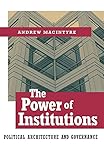The Power of Institutions : Political Architecture and Governance / Andrew MacIntyre.
Material type: TextSeries: Cornell Studies in Political EconomyPublisher: Ithaca, NY : Cornell University Press, [2018]Copyright date: ©2002Description: 1 online resource (208 p.) : 9 line drawingsContent type:
TextSeries: Cornell Studies in Political EconomyPublisher: Ithaca, NY : Cornell University Press, [2018]Copyright date: ©2002Description: 1 online resource (208 p.) : 9 line drawingsContent type: - 9780801487996
- 9781501731952
- 320/.6/0959 21
- online - DeGruyter
- Issued also in print.
| Item type | Current library | Call number | URL | Status | Notes | Barcode | |
|---|---|---|---|---|---|---|---|
 eBook
eBook
|
Biblioteca "Angelicum" Pont. Univ. S.Tommaso d'Aquino Nuvola online | online - DeGruyter (Browse shelf(Opens below)) | Online access | Not for loan (Accesso limitato) | Accesso per gli utenti autorizzati / Access for authorized users | (dgr)9781501731952 |
Browsing Biblioteca "Angelicum" Pont. Univ. S.Tommaso d'Aquino shelves, Shelving location: Nuvola online Close shelf browser (Hides shelf browser)

|

|

|

|

|

|

|
||
| online - DeGruyter Epic Singers and Oral Tradition / | online - DeGruyter Pharsalia / | online - DeGruyter Unsettled States, Disputed Lands : Britain and Ireland, France and Algeria, Israel and the West Bank-Gaza / | online - DeGruyter The Power of Institutions : Political Architecture and Governance / | online - DeGruyter Horizons of the Sacred : Mexican Traditions in U.S. Catholicism / | online - DeGruyter Business and the State in Developing Countries / | online - DeGruyter Putting Work in Its Place : A Quiet Revolution / |
Frontmatter -- Contents -- Preface -- CHAPTER 1. Power by Design -- CHAPTER 2. The Power Concentration Paradox -- CHAPTER 3. Tools and Cases -- CHAPTER 4. Political Architecture and Policy -- CHAPTER 5. Political Architecture and Change -- CHAPTER 6. Institutions, Governance, and Beyond -- References -- Index -- Cornell Studies in Political Economy
restricted access online access with authorization star
http://purl.org/coar/access_right/c_16ec
Conventional wisdom holds that "institutions matter." Here, Andrew MacIntyre reveals exactly how they matter in the developing world. Combining an eye for current concerns in international politics with a deep knowledge of Southeast Asia, MacIntyre explores the impact of institutions on effective governance. He examines the "national political architecture"-the complex of rules that determine how leadership of a state is constituted and how state authority is exercised. The Power of Institutions sets out an intriguing conundrum: one well-established body of literature decries the evils of highly centralized political systems, while an equally vigorous school of thought outlines the dangers of political fragmentation. MacIntyre presents the problems associated with institutional extremes, common in developing countries, as the "power concentration paradox." Either extreme is likely to be associated with distinctive governance problems. MacIntyre illustrates his wider arguments by focusing on Indonesia, Malaysia, the Philippines, and Thailand. He shows how their diverse political architectures influenced their responses to the Asian economic crisis and played into pressures for political reform. The Power of Institutions makes clear why the configuration of political institutions is one of the most pressing challenges in many parts of the developing world today.
Issued also in print.
Mode of access: Internet via World Wide Web.
In English.
Description based on online resource; title from PDF title page (publisher's Web site, viewed 02. Mrz 2022)


